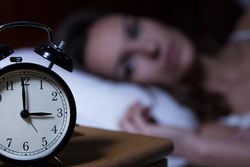5 Simple Ways to Improve Your Sleeping Habits

Sleep deprivation can cause a myriad of issues, including a lack of concentration, lower productivity, poor memory, and difficulty learning. Many people have their ways to cope with restless nights. However, sleep help experts say there are a few definitive ways to improve your habits over time.
How to Ensure You Sleep Well Every Night
1. Get Comfortable
For a good night’s sleep, your bedroom should be at the optimal temperature for relaxation, which is between 60 and 67 degrees Fahrenheit. Keeping your room cool and dark will help lull you into a peaceful sleep. To aid in your comfort, use soft bedding with a supportive mattress and pillows.
2. Establish a Routine
Before you turn in for the night, you should begin training your body for sleep by developing a soothing nighttime routine. Try calming activities like reading, light exercise or stretching, and taking a bath. These tasks can help your body wind down and prepare for sleep. However, you should avoid stimulating activities like work or stressful conversations because they are counterproductive.
3. No Technology
Television and smartphones are entertaining, but they can be distracting if you use them while in bed. The bright light they produce can reduce the production of melatonin, a sleep-promoting hormone. So, be sure to turn off all electronic devices, including tablets, computers, and gaming consoles.
4. Don’t Watch the Clock
 Though it is tempting to check the clock in the middle of the night, you should avoid it. Keeping track of the time while resting can induce stress and anxiety, which makes it harder to fall asleep. If you have to set an alarm, arrange the clock so that it is out of your line of vision.
Though it is tempting to check the clock in the middle of the night, you should avoid it. Keeping track of the time while resting can induce stress and anxiety, which makes it harder to fall asleep. If you have to set an alarm, arrange the clock so that it is out of your line of vision.
5. Avoid Stimulating Beverages & Snacks
Many people use alcohol as a way to reduce insomnia because it initially acts as a depressant. However, after a few hours, it begins to behave as a stimulant, which is why most sleep help experts agree that alcoholic beverages are not a reliable sleep aid. Avoid eating or drinking caffeinated beverages or snacks within three hours of bedtime, including chocolate, soda, and coffee. Caffeine is also found in some over-the-counter medications.
Peggy Sealfon of Peggy Sealfon-Stonewater Studio is an internationally-known stress and anxiety expert who also offers sleep help to those who are suffering from sleep deprivation. As a personal development coach, speaker, author, and productivity strategist, she works with individuals to provide them with the tools they need to reduce stress and eliminate sleepless nights. For more sleep help or to learn about how to enhance your physical and mental well-being, call (239) 821-2266 or visit the website today.
About the Business
Have a question? Ask the experts!
Send your question

